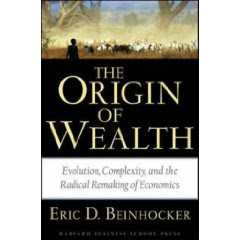
This is an "must read" book. It looks at the the thinking in economics, surveys the history of economic thought, explores new ideas in evolution, adaptive systems, complexity, and emergence to show the way past the limitations of the super-rational "homo economicus" of traditional ecnomics. It then applies this understanding to an analysis of how "evolution creates wealth". (Sadly, this analysis is one of the weakest sections of the book.) Finally, the book closes by looking at the way forward.
This book was published in 2006, before the financial meltdown, but it presents a framework of ideas in which the current collapse can be understood. Here is a bit from the chapter "Finance":
The summer of 1998 may be remembered as the moment when one era of finance theory ended and a new one began. The great stock market crash of 1987 had shaken the foundation of the ivoery tower, but the events of 1998 started it crumbling. The incredible volatility of the markets, the cascading of crahses from one market to another, and the sudden changes in perceptions of risk were all phenomena for which Traditional Economics offered little or no explanation. It was also the height of irony; the key architects of Long-Term Capital's investment strategy were also two of the fathers of modern finance theory, Robert Merton and Myron Scholes, both Nobel Prize winners. As Merton noted the day after Long-Term Capital's crash, "according to our models this just could not happen" -- yet there it was, on the front page of the Wall Street Journal.I like the way this book shows that the tradition left/right divide is wrong-headed and based on out-moded ideas:
More recent events have only served to raise further questions about the Traditional Economics view of finance theory. In the neat, rational, equilibrium world of Traditional finance, stock market bubbles do not exist. Yet, during the great bull market of 1997 to 2000, over $12.7 trillion of value was added to U.S. financial markets, and then in the great fin de siecle bust, $10.8 trillion evaporated just as quickly. The gap between thye real world and the textbooks could no longer be ignored.
The Right is correct in that individual responsibility still matters and positive behaviors often lead to positive ouytcomes. Cultural norms may explain the heritability and persistence of certain behaviors, but they do not morally excuse antisocial activities. Likewise, while social mobility may be lower than popularly perceived, the United Stats is still a relatively mobil society, particularly for the middle classes.Beinhocker endorses a path forward proposed by Matt Miller to design a system that combines equality of upside opportunity with a downside social safety net. This is to be achieved by four policy proposals:
But the Left is also corrrect. The birth-lottery of endowed wealth, native intelligence, and race taken together do play an important role in explaining economic outcomes (even if their individual contributions are modest). The birth-lottery argument becomes even more compelling if one adds culture to the lottery; after all, one cannot choose the culture that one is born into.
- universal health coverage
- raise the quality of public education
- reform education through a "grand bargain" between Left and Right to allow a voucher system in exchange for de-linking education spending from property taxes (letting the rich buy better schools for their kids) and raising overall investment in education
- a federal guarantee of a "minimum living wage" to put a floor under people's incomes
This book is essential reading to help understand the current financial crisis and understand what kind of thinking will be required to move us out of the current mess.


No comments:
Post a Comment